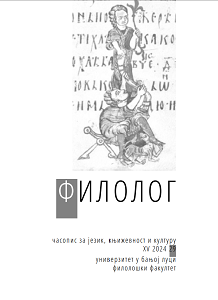ГРАЈСОВ ПРИНЦИП КООПЕРАТИВНОСТИ У ДРАМИ ПИГМАЛИОН ЏОРЏА БЕРНАРДА ШОА
GRICE'S COOPERATIVE PRINCIPLE IN GEORGE BERNARD SHAW'S PLAY PYGMALION
Author(s): Svetlana ObradovićSubject(s): Studies of Literature, British Literature
Published by: Филолошки факултет Универзитета у Бањој Луци
Keywords: maxims of conversation; the maxim of quality; the maxim of quantity; the maxim of relevance; the maxim of manner; Pygmalion;
Summary/Abstract: This paper deals with the analysis concerning the flouting of Grice's cooperative principle in Pygmalion, by Irish playwright George Bernard Shaw. The investigation was accomplished with the aim of determining the maxims which were flouted, how often they were flouted, as well as determining which rhetorical strategies and submaxims dominate certain maxims. Within this qualitative research based on descriptive analysis, 111 dramatic dialogues, illustrating a wide specter of the above-mentioned flouting was found. The analysis showed that the maxim of quality was flouted in 54.05% of dialogues, while metaphor represented the most frequently found mechanism of this maxim due to the fact that metaphorical transfer of meaning was the predominant feature of literary style. There were 13.51% of dramatic dialogues in which respondents gave irrelevant answers or answers that did not suit the topic of conversation. The maxim of quantity followed the maxim where one tried to be truthful and did not give information which was false or that was not supported by evidence making a total of 22.51% of dialogues, while there was 9.09% of dialogues in which the characters were unclear or ambiguous. Rather than affecting the process of communication, the floutings reflect the playwright creativity and are used to express deep sarcasm, babbitry, superficiality and hypocrisy.
Journal: Филолог – часопис за језик, књижевност и културу
- Issue Year: 15/2024
- Issue No: 29
- Page Range: 211-226
- Page Count: 16
- Language: Serbian

